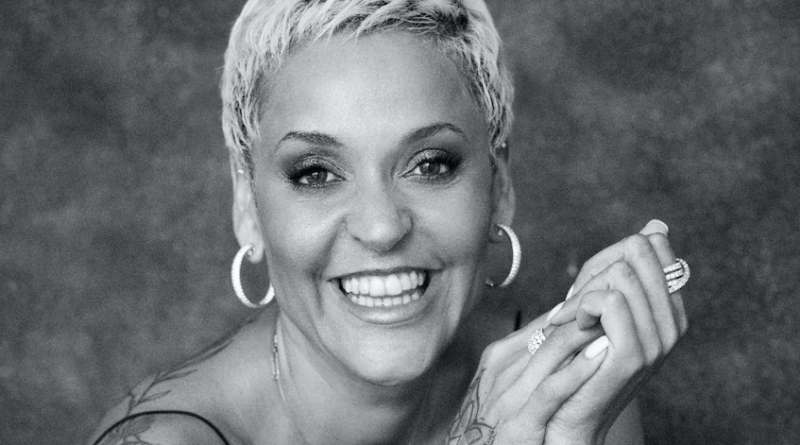REVIEW: Mariza’s singing is enthralling at NJPAC
Photo: Mariza, a fado singer from Lisboa, Portugal, recently sang at the New Jersey Performing Arts Center in Newark, New Jersey. Photo courtesy of the artist / Provided by Cindy Bryam PR with permission.
NEWARK, N.J. — Mariza, arguably the most famous fado singer working right now, offered a touching, powerful and all-encompassing concert Sunday, Jan. 23 at the New Jersey Performing Arts Center. Building a set list with classic tunes from her 20-year repertoire, with a few newer songs thrown in the mix, the singer was able to hold the packed audience in the palm of her hand as she emotionally and convincingly interpreted songs of love, struggle and life.
The two-hour concert began with her five-person band, sitting on a raised platform, appearing in silhouette as the lights were dimmed. Then Mariza, also silhouetted in darkness, walked on stage, and it was as if the audience could sense her presence. She began her fado singing with “Estranha Forma de Vida,” followed quickly by “Semente Viva.” Her interpretation of these songs was a full-voice and full-body effort. She bent and swayed with the emotive lyrics of the tunes, feeling the pain and opportunity with her swirling hands, stomping feet and far-off glances to someone not there.
Fado is a Portuguese art form that finds the singer offering sorrowful, yet somehow uplifting renditions of melancholic songs. A fadista, like Mariza, needs to have the song pulsate throughout the performance venue, whether it’s the voluminous NJPAC in Newark, New Jersey, or a tiny club in a tucked-away alleyway of Lisboa, Portugal. Often singers close their eyes during the performance, summoning energy and inspiration from unknown depths, and the lyrical words, centered on love, life and death, become multi-syllable parades with vowels extended to their maximum effect. The late Amália Rodrigues is seen as the best fadista in history, and Mariza is her heir apparent. The two have a connection as well; Mariza recently recorded an album of Amália covers, and she offered a selection for the audience Sunday night.
Other tunes included “Beijo de Saudade,” “Cravos de Papal” and “Lágrima.” Then, Mariza changed the vibes for the evening. Perhaps she knows that fado is best experienced on a more intimate level, and the NJPAC, although a beautiful setting, is a mega-concert hall, perfectly fit for Mariza’s booming voice but less so for her one-on-one dramatic recitations. Mariza somehow carved out an intimate space in the middle of the concert when she pulled up a chair next to her accompanying guitarist Diogo Clemente, and later they were joined by Luís Guerreiro, Mariza’s longtime collaborator and interpreter of the Portuguese guitar. They sat stage right, looking at one another, not the audience, while Mariza sang “Chuva,” “Meus Olhos Que…,” “Há Palavras…” and “Senhor Vinho.” Sometimes the singer even set aside the microphone and simply sang without the heavy use of amplification. One could squint their eyes and picture themselves in Portugal on a late Saturday night with the sun set to rise in a few hours.
In between the transfixing songs, Mariza offered stories about her background (she was born in Mozambique and eventually moved to Lisboa), her early days of fado singing (she began when she was 5 years old), and her outlook on music and life (“love” was a common descriptor used).
The final third of the concert was when Mariza’s powerful singing, never letting up and never letting go, enveloped the audience. She sang one song right after another, with each tune transcending the previous one. She hit high notes, she held long notes, she danced, she turned this sometimes-somber musical style into a musical parade, instigating sing-a-longs and clapping hands. The audience, many of them following along when Mariza offered stories in Portuguese, felt seen and heard; they could live and appreciate their cultural roots and the wonderfully novel ways Mariza was taking the art form.
Classics like “Maria Lisboa” and “Amor Perfeito” closed out the main set and were followed by a two-song encore: “Insensatez” and “Barco Negro.” And then with a final wave and a simple bowing of her head, Mariza was gone, her resounding voice still warming the hearts of audience members as they headed out into the cold, wintry night.
By John Soltes / Publisher / John@HollywoodSoapbox.com
Click here for more information on Mariza.



Great review John. I saw Mariza two nights before at the Kennedy Center. It was fantastic!
Larry